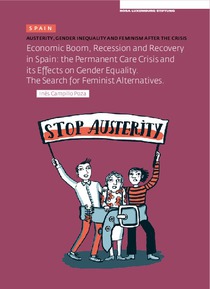Economic boom, recession and recovery in Spain: the permanent care crisis and its effects on gender equality. The search for feminist alternatives
"The economic crisis initially affected men more markedly than women, as job destruction primarily affected the male-dominated construction sector, but unemployment rates between men and women soon began to converge. However, even if job destruction hit men and women alike, austerity has had a...
| Main Author: | |
|---|---|
| Institution: | ETUI-European Trade Union Institute |
| Format: | TEXT |
| Language: | English |
| Published: |
Berlin
2018
Rosa-Luxemburg-Stiftung |
| Subjects: | |
| Online Access: | https://www.labourline.org/KENTIKA-19301292124911294749-economic-boom,-recession-and-r.htm |
| _version_ | 1771659896067981312 |
|---|---|
| author | Campillo Poza, Inés |
| author_facet | Campillo Poza, Inés |
| collection | Library items |
| description | "The economic crisis initially affected men more markedly than women, as job destruction primarily affected the male-dominated construction sector, but unemployment rates between men and women soon began to converge. However, even if job destruction hit men and women alike, austerity has had a far greater impact on women and gender equality, deepening imbalances already present prior to the crisis. The elimination of the Equality Ministry, the removal of the so-called "baby check", the introduction of serious budget cuts to the Dependency System, the suspension of the Educa3 Programme aimed at investing and expanding the early education and care system, healthcare cuts and the introduction of co-pays in certain areas, the freezing of public sector hiring, civil servant pay cuts and increased working hours, as well as labour market, unemployment system and pension reforms all primarily impact women. Women are the main providers of both formal and informal care, the main employees of the welfare state, and their employment status and contribution records are generally weaker. Likewise, the state budget for gender equality has been dramatically decreased, from 43.240 million euro in 2008 to 19.741 million euro in 2017. The state budget for gender violence prevention and services has also been cut, from 31.077 million in 2010 to 27.728 in 2017 (Plataforma Impacto de Género Ya 2017).
Macroeconomic data have improved since 2014, and government statements and the media are flooded with a discourse of recovery. In fact, the IMF recently (July 2017) praised Spain for its "impressive" economic recovery and strong job creation. In reality, however, job creation is largely restricted to non-standard employment (such as temporary and deregulated part-time jobs), meaning that jobs are destroyed as fast as they are created. The unemployment rate still stands at 16.5% (2017) and the number of households in which all active members are unemployed has increased to 1,394,700 households, 344,500 of which are single-person (mainly women-led) households. Both the poverty rate (especially child poverty) and the number of households having trouble making ends meet have risen.
Building an alternative to neoliberal austerity is thus necessary and urgent. Feminism, which is growing worldwide and in Spain in particular, can provide us with useful tools to develop innovative alternatives. Traditional social democratic recipes are not very useful, as they take the abundance of natural resources for granted and presuppose the centrality of production and consumption, thereby reinforcing the androcentric valorisation of waged labour and neglect of non-commodified activities such as, most fundamentally, care work." |
| format | TEXT |
| geographic | Spain |
| id | 19301292124911294749_a5528a431601451ba9e52a4ab48f84cd |
| institution | ETUI-European Trade Union Institute |
| is_hierarchy_id | 19301292124911294749_a5528a431601451ba9e52a4ab48f84cd |
| is_hierarchy_title | Economic boom, recession and recovery in Spain: the permanent care crisis and its effects on gender equality. The search for feminist alternatives |
| language | English |
| physical | 54 p. Digital |
| publishDate | 2018 |
| publisher | Berlin Rosa-Luxemburg-Stiftung |
| spellingShingle | Campillo Poza, Inés economic recession gender women economic and social rights Economic boom, recession and recovery in Spain: the permanent care crisis and its effects on gender equality. The search for feminist alternatives |
| thumbnail | https://www.labourline.org/Image_prev.jpg?Archive=134601395288 |
| title | Economic boom, recession and recovery in Spain: the permanent care crisis and its effects on gender equality. The search for feminist alternatives |
| topic | economic recession gender women economic and social rights |
| url | https://www.labourline.org/KENTIKA-19301292124911294749-economic-boom,-recession-and-r.htm |

